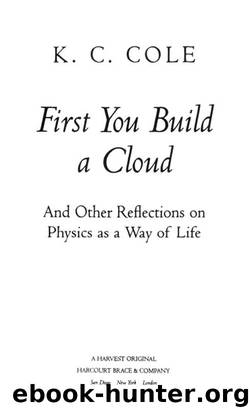First You Build a Cloud by K. C. Cole

Author:K. C. Cole [Cole, K. C.]
Language: eng
Format: epub
Publisher: Houghton Mifflin Harcourt
Quality and Quantity
Dust, sand, pebbles, rocks, and boulders are all made of the same material. They just contain different quantities of the same stuff. But we view them as qualitatively different. So in that sense, quantity is quality.
—PHILIP MORRISON
This notion that merely having more of something (or less of it) can change the nature of things qualitatively is at the heart of quantum mechanics. But it also can be one of the hardest aspects to accept Physicists tend to give people the creeps when they start describing the fundamental building blocks of nature in terms of quantum "numbers.” How can the addition or subtraction of single units of spin or electric charge or other "quantities” make the difference between neon and sodium? Or ultimately apples and oranges? The immediate explanation, of course, is that units of electric charge, for example, determine the chemical properties of things, but there is a much more interesting and fundamental relationship
One of the first people to recognize the intimate connection between quality and quantity was the sixth-century B.C. Greek philosopher Pythagoras. He discovered that the pitch of a note depends on the length of the string producing it, and that pleasing intervals are those corresponding to simple mathematical ratios: 2:1 producing an octave; 3:2, a fifth; 4:3, a fourth; and so on. The quality of musical tones—like the qualities of elements—is based on the numerical relations of their parts.
Today the evidence that quantity affects quality is everywhere. The quantity of money or education you have may or may not make a difference in the quality of your life, but the quantity of pollution, noise, and crime in your neighborhood almost certainly does. Rapid increases in the overall quantity of otherwise beneficial things (cars, plastics, houses—even people) can turn them into qualitative disasters. Medicine taken in too large doses can be poisonous. And bigger (nuclear) bombs do not merely produce bigger wars: The difference between killing millions of people and wiping out civilization is qualitative, not quantitative.
One of the most impressive qualitative changes produced by sheer increase in quantity is the human brain. “When people evolved from the animal kingdom," says physicist Weisskopf, "something new must have happened. We contend that this new element is based solely upon a quantitative difference in the nervous system. By an increase in this system, nature established a new type of evolution that broke, and will break, all rules established in the previous evolutionary periods." Naturalist Gould is similarly impressed: "Perhaps the most amazing thing of all is a general property of complex systems, our brain prominent among them—their capacity to translate merely quantitative changes in structure into wondrously different qualities of function.”
It takes a large quantity of atoms to make an organic molecule, and a large quantity of organic molecules to make a person, and a large quantity of people to make a crowd or a country. But in each case, it’s clear that the difference is a lot more than quantitative.
This ability of quantitative changes to produce dramatic qualitative differences also becomes dramatic at extreme temperatures.
Download
This site does not store any files on its server. We only index and link to content provided by other sites. Please contact the content providers to delete copyright contents if any and email us, we'll remove relevant links or contents immediately.
Enlightenment Now: The Case for Reason, Science, Humanism, and Progress by Steven Pinker(7303)
A Journey Through Charms and Defence Against the Dark Arts (Harry Potter: A Journey Through…) by Pottermore Publishing(4796)
The Immortal Life of Henrietta Lacks by Rebecca Skloot(4571)
A Journey Through Divination and Astronomy by Publishing Pottermore(4376)
Elon Musk by Ashlee Vance(4118)
Origin Story: A Big History of Everything by David Christian(3679)
COSMOS by Carl Sagan(3617)
Alchemy and Alchemists by C. J. S. Thompson(3509)
Bad Pharma by Ben Goldacre(3419)
Enlightenment Now by Steven Pinker(3363)
Shadow of Night by Deborah Harkness(3352)
Inferior by Angela Saini(3310)
A Mind For Numbers: How to Excel at Math and Science (Even If You Flunked Algebra) by Barbara Oakley(3293)
Origin Story by David Christian(3191)
The Code Book by Simon Singh(3172)
Signature in the Cell: DNA and the Evidence for Intelligent Design by Stephen C. Meyer(3123)
The Elements by Theodore Gray(3050)
A Brief History of Time by Stephen Hawking(3017)
A Journey Through Potions and Herbology (A Journey Through…) by Pottermore Publishing(2843)
